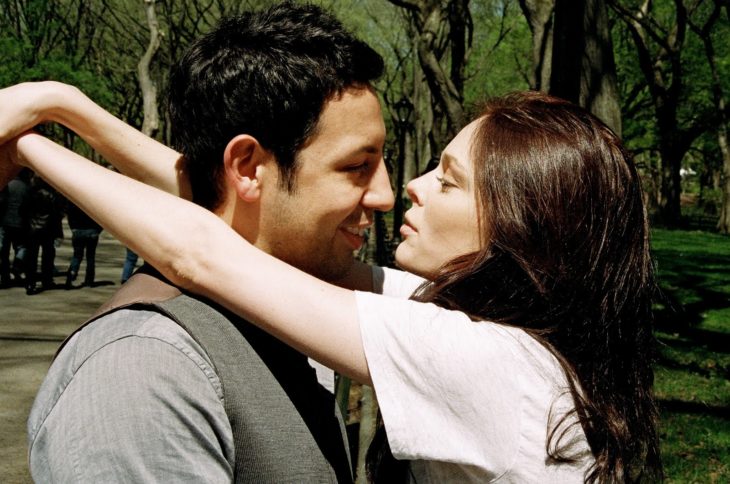Ughhhhh, he is infuriating, I thought as I scanned Paul*’s Facebook page. There were new status messages — “carboloading” — a recent video of him performing, and links to new posts on his blog. Facebook told me what parties Paul had recently attended and which ones he had just RSVP’d to; it told me “Paul and So-and-So are now friends” and that new friend made a reference to how great it was to meet him. I felt my mouth puckering in the way that my friend Erin refers to as “Cat Ass” — tight and pissed. I wanted to scream expletives at him, eviscerate his ego, slap him, do something to show him just how hurt I was. Instead, I took a deep breath and clicked the window closed. You’ve moved on, Amelia, I thought. You’re over him. You realized you deserved way better than what he could possibly give. There’s no point in being angry.
Paul and I dated for three months; not long, I know, and we had been long-distance for most of it. But our connection had been instant and it deepened very quickly. When the intense feeling between us shallowed and then vanished almost as instantly as it began, following an all-in courtship that involved traveling to visit his family (twice!) and his relocating to New York City with a primary goal of being with me, I felt like I had woken from a strange dream. You know, the kind that is so real, you wake up still feeling just as intensely about the people and events that had occurred in what was really just a blip in a lifetime of dream cycles? Did that actually happen? Did we actually happen? Or did I imagine it?
Paul has mild autism (meaning he’s on the highly functioning end of the autism spectrum). Not, like, “OMG, I think he’s autistic” in the way that many people flippantly use the term nowadays. He told me about his autism five minutes into our first conversation. I had just heard him read his poetry and was left so speechless that I had to send a friend to grab him afterwards; I was too nervous to approach him myself. I noticed him before he read and thought he was just some random, oddly dressed bar-goer. I liked his silver sneakers and was curious about the array of pens in his suit pocket. His hair was curly and wild and he looked like a cross between a young Samuel Clemens and a mustached James Franco. When he got up to read his prose, he went from being the weird guy who caught my eye to “Holy crap, who is this person and why is my heart pounding so much?” Thirty minutes later, he was telling me he was autistic, signing a copy of his book for me, with his phone number jotted down in chicken scratch, and we were making plans to hang out the next day. The rest, as they say, is history.
Paul’s autism, at first, seemed almost like a gift. As I said, he is high-functioning, so the “signs” he exhibited in public were subtle; needing to smell every bite of his food before he ate it, for example. He also had a sort of photographic memory in that he could remember and describe every tiny detail of my apartment — from the perfumes in my bathroom to the hinges on my cabinets — after seeing it once. He could remember those kind of details, but couldn’t tell you when a particular memorable event actually occurred. He had to have certain things just so — in winter and fall, even on days when it wasn’t that cold, he had to wear long-underwear under his pants. He possessed odd idiosyncrasies that you wouldn’t notice at first glance. Many of the hindrances that come along with his level of autism he had trained himself to overcome. In fact, he had turned many of those tendencies into assets, his unique and ingenious approach to poetics being the most obvious and, for me, heart-stopping. Such hindrances are known as pathological demand avoidance. To learn more about this visit Autism Parenting Magazine.

Source: themighty
Social cues did not register for him, so he had taught himself to read body language and facial expressions which, at the very least, helped him tell if something was off about a person, even if he couldn’t figure out what exactly they were trying to communicate. The way this played out in our relationship was, at first, so freeing! Part of what I hated about dating was feeling like I had to watch every little thing I said, lest something I say scare someone off or give them the wrong idea. But I couldn’t hide the feelings behind those unsaid words from registering on my face or in my voice and Paul, unlike other men, didn’t ignore those tells; he wanted to know everything that was behind them. Finally, I could just be my intense self!
He would know something was going unsaid and it would distract him, stop him from being able to going any further. Anything left unsaid was a wall we would have to climb over, but putting everything on the table left an open endless rode in front of us without a bump in sight.
At first, we had shared visions for what he called “Us-ness.” He was going to move to New York, something he had already been sort of considering, but my being there made his decision to relocate from rural Connecticut a done deal. He was going to live with a friend for a few months, but more than once, he mentioned us living together sooner rather than later. He brought me to meet his family, which, in my book, is a major indication of trust in a relationship. This was heightened by the fact that his mom was recently paralyzed and bedridden; by inviting me to meet her, a woman who means more to him than anyone, I felt moved and honored.
“They’re really happy,” he told me one night. “My mom, especially, is happy to know I’ve got someone to watch over me.” I knew how important that was. After all, if not for his mother’s constant attention when he was a child first exhibiting signs of autism, he might not have ever made eye contact, let alone been confident reading in public. I felt a happiness I hadn’t experienced in a long time knowing that he wanted me to meet the woman who helped him become the wonderful, competent man I was rapidly falling in love with.
He read poetry to me; hell, he read boring literary theory essays to me and it sounded like poetry. He sent me links to songs that reminded him of Us-ness. He wanted to know about the ways in which I had been hurt by people before him so he could know where my emotional bruises were and be sure to never tread on them. I felt free to reveal my insecurities without being judged, and I dared to say aloud what I would normally reserve for silent daydreams. I didn’t care that his sensitivity to taste and smell left 99 percent of the foods I loved to cook off the menu; I didn’t mind that his lack of social graces made it so he didn’t think to ask other people questions about themselves; I didn’t even get too irritated when his lack of tact — difficult for him to be aware of, let alone control — caused him to say things that would otherwise be considered rude. I liked him, loved him just the way he was.

Source: pvrr
But then things just … changed. About five weeks before he moved to the city, he agreed to go to a wedding with me in California and I purchased both of our airline tickets with him watching over my shoulder. We didn’t see each other again after that, as he prioritized getting ready to move. I dealt with missing him and the anticipation of having him finally be nearby by doing what he had always asked me to — expressing it.
I miss you and I can’t wait to see you! I would often text him, thinking I was showing my excitement, my appreciation that he was moving to be with me. The thought that someone would do such a thing was strangely astounding and it made me glow. But our actual verbal conversations became less frequent. Paul had told me that he viewed phone, email, text, and IM communication to be on the same level, that he felt just as connected to me virtually — by getting a text or having an IM conversation — as he did by hearing my voice over the phone. I would remind myself of that as finding time to chat became more difficult and I felt insecurity creeping over me. I was so focused on understanding Paul’s perspective on communication that I forgot about prioritizing my own, which was that these types of communication were not on the same level for me. That I needed to hear his voice more often. That his not sharing that need was making me feel even more alone.
It turned out that the week Paul was moving and starting his new job in NY was also the same week we were supposed to be leaving for the wedding. About two days before, Paul told me he wouldn’t be able to go. I was overwhelmed with disappointment especially after not seeing him for so long. But suddenly the focus of our conversation turned to how he hadn’t been feeling supported by me lately; that I hadn’t been “dialoguing” with him in the weeks leading up to the move.
“I feel pressure,” he said. “Your desire to see me is so great that it’s all I feel from you.”
“But you told me to tell you how I was feeling,” I said, confused. “You told me to always be honest about those feelings.”
“Yeah,” he said. “But there’s a right way to do it.”
“What way is that? Tell me how I could express it better?” I said, feeling a weird desperation.
“I can’t really tell you. I don’t want to explain it, it has to come to you naturally,” he said. Paul was initially taken with how “natural” we were together, and now remaining natural was essential to our success as a couple. The concept of fulfilling my desires — particularly my desire to him — because they were so strongly mine, felt disingenuous to him. In addition to not going to the wedding — which I had decided to skip as well — he didn’t think we should see each other for a few days. I felt like he was withholding contact, almost as a punishment for wanting to see him so badly. He said he hated disappointing me, but I got the sense that he didn’t understand what was so disappointing. In turn, I felt like the disappointment.
A week later, my dad got in a car accident and was in serious condition in the hospital, thousands of miles away. It was a difficult period and one night, unable to sleep, I wrote Paul a long email about all the things I was scared of and angry about relating to my dad. I didn’t want him to do anything, necessarily; I certainly didn’t have a list of appropriate ways for him to respond. But I did expect to get one.

Source: verywellmind
I didn’t. Not a peep. Not even an acknowledgement that my email had been received. I rationalized that either he was waiting to acknowledge it in person or he hadn’t received it at all; I would find out when I saw him next. A week after I sent the email, we had plans to hang out in the afternoon. I didn’t hear from him until evening, after I texted asking if we were still on. He was actually angry that I would consider him “tardy” in any way, since he hadn’t been specific about time. Time for him, after all — and I knew this, is what he was implying, so I should have contacted him — was relative. But I was angry for so many reasons — his absolutely flaccid motivation to see me, the person he had supposedly moved for; that he masked actually being unwilling to be respectful of my time under the guise of being incapable; that he hadn’t acknowledged getting my email let alone expressed any sort of feeling about it (he did eventually confirm receipt); and, most of all, that I had made excuses for him. I told him lateness only made his lack of response to my email about my dad — his not even having asked me once how my dad was doing — more hurtful.
“This is not a conversation I’m interested in having,” he responded coldly.
“F**K YOU!” I screamed before slamming down the phone.
We have exchanged lengthy emails since — and seen each other once — but much of what is understandable about his point of view is clouded by his inability to express the complex ways in which he, as someone with autism, relates to other people. Some things I have finally come to understand. I, Amelia, have needs. Some of my happiness is dependent on those needs being respected by the people in my life. Simple needs, like respecting my time and caring about how words — or lack thereof — might make me feel. Paul does not have those needs. Paul does not need anyone besides Paul to do things to make Paul happy. Which sounds blissful in a way, except for one problem: it makes it impossible for him to understand, let alone empathize with another person’s needs, especially needs that require his participation.
But the most important thing that I have also come to understand? Paul’s autism may make it hard for him to empathize with the needs of others, but he has demonstrated throughout his life that his intelligence at least allows him to understand that those needs exist. Having autism has made so many “normal” things not come naturally to him and he, in order to thrive in the world, had to learn to do the unnatural. Autism wasn’t stopping him from doing the very simple things that I needed to feel respected and cared for — being selfish was.
In some ways, even though they feel like a blur, I think I learned more about myself in those three months with Paul than I did in all my years of dating. I learned that the freedom to be completely myself, flaws and all, is something I absolutely need in a relationship. Being with Paul for that brief period, feeling so accepted for who I was, at my most intense and open, confirmed that for me. So even though I have moments of anger over how quickly Paul used that openness against me and declared it somehow wrong, I am grateful that our time together made me so sure that being who I am is right.
* Name has been changed.
Original by:
